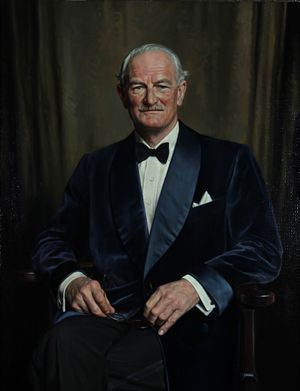John Kidston Swire
| John Kidston Swire | |
|---|---|
 | |
| Born |
19th February 1893 London |
| Died | February 22, 1983 (aged 90) |
| Spouse(s) | Juliet Richenda Barclay |
| Parents | John 'Jack' Swire and Emily Hamilton Campbell Kidston |
Contents
Biography
John Kidston Swire, known to his family
and friends as Jock, was the elder son of
Jack Swire (1861-1933) and grandson of
John Samuel Swire. He joined the family
business in 1913 and arrived in Hong Kong
just before the outbreak of World War I.
As a commissioned officer with the Essex
Yeomanry, from August 1914 he was attached
to the Hong Kong Volunteer Corps as 2nd
Lieutenant, patrolling nightly between
Deep Water Bay and Aberdeen on his horse,
Shanghai, to keep a lookout for German
raiders. In so doing, he earned himself the
nickname ‘Deep Water Bay Hussar’.
Like his father and grandfather, an
accomplished and passionate horseman,
Jock Swire also spent his leisure hours in
the saddle, competing regularly in amateur
race meetings and gymkhana events at
Happy Valley Racecourse. After frantically
seeking to be released for active duty,
he rejoined the Essex Yeomanry in France in
1915. During the war, he was twice wounded,
remaining partially deaf as a result, before
being appointed as an instructor at the
Cavalry Corps Equitation School. His younger
brother Glen was killed in action at Ypres
in 1915, aged 18 years.
After his release from the armed
forces at the end of 1919, Jock Swire was
made a Director of John Swire & Sons and
put in charge of the company’s overseas
staff. Throughout his career, he retained
a strong sense of obligation to Swire
staff and went to great lengths to try to
improve conditions for them. He was ahead
of his time in realising the importance of
communicating with staff at all levels and
ensuring that employees felt valued and
were adequately rewarded and motivated
to reach their full potential. His — for the
time — revolutionary innovations included
giving female staff the same employment
conditions as men; recruiting graduates from
the best universities to train for management
positions in Swire’s China offices, and
insisting they learn to speak Chinese and
assimilate Chinese customs and culture.
He also set about replacing the out-dated
comprador system with Chinese university
graduate management trainees.
During World War II, Jock Swire was
made Chairman of the London Shipowners
Dock Labour Committee (1941-5) involving
tortuous negotiations with the unions to
ensure the smooth operation of requisitioned
merchant shipping carrying troops, fuel and
stores to back up the Allied advance. When
German bombing became intense, Swire,
with typical generosity, evacuated his staff
to his mother’s house in Essex and they
commuted to London together daily.
By the end of the war, the firm faced
critical losses in its shipping business;
its established Hong Kong industries lay
in ruins, other properties looted. In 1946,
now Chairman of JS&S, Jock Swire toured the
firm’s interests around the region, consulting
with and encouraging staff and planning the
resurrection of his shattered businesses;
it was largely thanks to his courage, fortitude,
optimism and foresight that Swire’s
operations were rebuilt. There was no war
damage insurance to turn to and it took a very
great idealist to borrow money to start again
at a time when few would have predicted
Hong Kong’s future success. If Hong Kong
were to survive, it would be critical that its
status as a free port be restored and made
credible. It was established firms like Swire
and Jardines, together with the banks, which
had faith in Hong Kong and were willing
to take the risks that laid the foundations for
its future prosperity. Typically, Jock Swire
said afterwards he did it from a sense of duty
to his staff past and present.
Jock Swire was also instrumental in
creating one of the world’s best-known
airlines. Despite an unpromising introduction
to air travel in 1930, when he bucketed across
China piloted by a drunken American pilot
who sat his girlfriend on his knee and let her
fly the plane, Jock Swire became fascinated
by the world of aviation. Early on he realised
the future of transport lay in the sky. In spite
of the misgivings of his more conservative
directors — and particularly his uncle,
Warren Swire — he persuaded the board to
acquire a majority stake in Cathay Pacific
Airways and to take on its management.
It took resolution to nurse Cathay through
the early battles for traffic rights — battles
that echoed the rate wars his grandfather
had fought to establish his shipping
business on the Yangtze. Jock Swire lived
to see his shoe-string airline grow into
a respected international carrier.
Jock Swire was tall and good looking, with an immense zest for life. He enjoyed meeting people, made friends easily and had a ready wit and sense of the absurd. A man of great integrity, he was certainly no mincer of words if he believed something was wrong or unjust. Critically, he listened to others, absorbed their opinions and was willing to change his own.